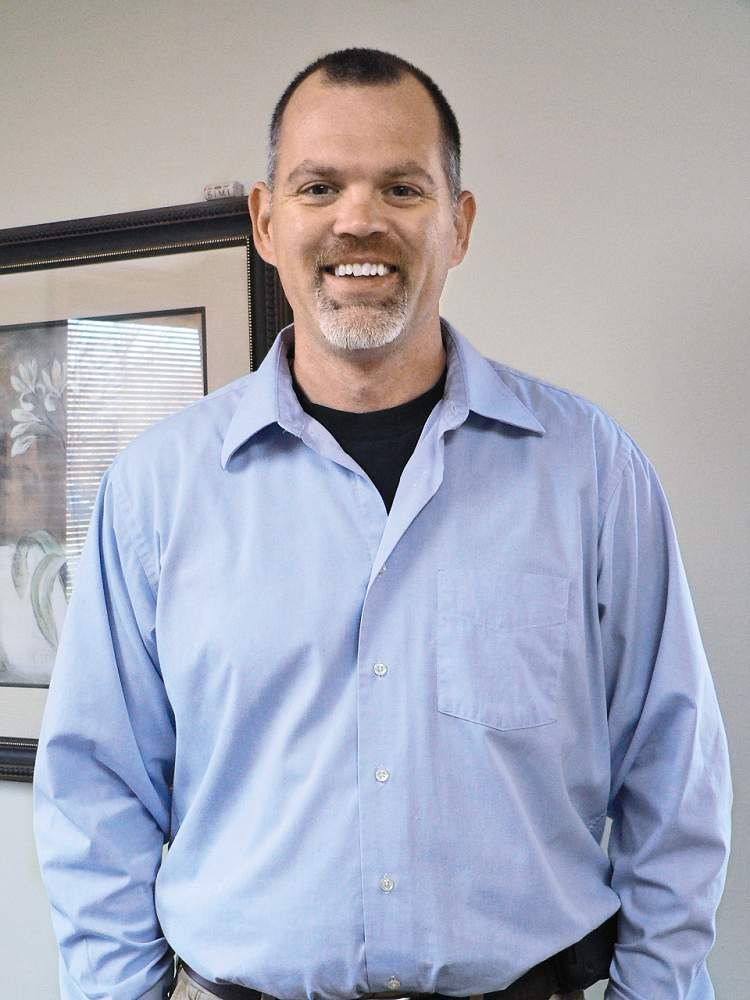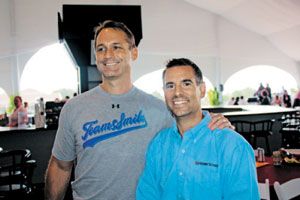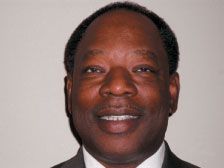Special people delivering special care
Jason Wesco Community Health Center of Southeast Kansas
Jason Wesco
Community Health Center of Southeast Kansas

Without going to school to learn dentistry, you might wonder if someone like Jason Wesco understands the ins and outs of running practices and providing high-quality dental care.
But once you learn a little about Wesco, the Chief Operations Officer for the Community Health Center of Southeast Kansas (CHC/SEK), it becomes clear that he knows plenty and that his hard-working staff not only knows how to deliver great care, but is determined to do so every day, even for those patients who can’t afford to go somewhere else for treatment.
The federally qualified patient-centered health center is the state’s largest safety net dental clinic and is dedicated to providing quality health care to all regardless of their ability to pay.
“Our goal is to fill the gaps in the health care system,” said Wesco, describing the four clinic sites in Allen, Crawford and Cherokee counties that serve an economically challenged population. “That means largely that we take care of people who have very little resources, but we take care of everybody regardless of their ability to pay.”
Southeast Kansas consists of some of the least healthy counties in the state, which means the clinics’ staffs are working with populations struggling with low income, low education levels and also many patients with instances of heart disease and cancer.
“Southeast Kansas historically has been incredibly underserved and incredibly unhealthy,” said Wesco, who has six full-time dentists and nine full-time hygienists working out of the four very busy clinics. “That’s the reason why we exist. To help people get better.”
The great need for dental care in the areas served by CHC/SEK has brought on tremendous growth for the organization. In 2003, the first year it received federal funding, CHC/SEK saw 3,000 patients who visited about 6,000 times. This year, Wesco expects the clinics to see 25,000 patients some 80,000 times.
“It’s been explosive, and I think it’s been a couple of things,” he said. “One there’s a lot of need in our part of the world and two, I believe we deliver high-quality services to our patients. “While they may not be able to go somewhere else and get a dental visit for $35 or a medical visit for $10, they can choose to not go at all. They’re coming back to us, so I think we’re doing something right.”
Medicare, Medicaid, HealthWave and private insurance are all accepted, but Wesco believes the best thing about his clinics is indeed its quality of care. It takes a special type of person to work so hard with so many difficult cases, he said. That’s why the 35-40 dental staff members-that includes billers, front desk and dental assistants-are really what make the clinics so special.
“The kind of work we do is very difficult because people have gone without for so long,” said Wesco, who got his start in dentistry when he took a job as the director of a non-profit clinic in Lawrence, Kan., 10 years ago. “You’re dealing not only with bad oral health, but you’re dealing with a lack of education and with developmental disabilities.
“So these guys (on the dental staff), in my estimation, are heroes. We have a lot of special people on this staff.”
Wesco admits that attracting staff members to the Pittsburgh, Kan., area may seem like a hurdle to some, but there are a number of things working in his favor. The facilities feature great technology and equipment including digital radiography, a number of clinicians have a calling to help needy patients, and there are programs such as the National Health Service Corps Scholars that assist dental students with education finances if they in turn agree to serve areas of high need.
“We really believe our patients deserve the best, and our staff deserve the best. To a certain extent, the work that we do and the way that we do it attracts people,” he said of his ability to bring in great staff.
Now Wesco consults with most of the safety net dental clinics in Kansas on program development and recruitment. The clinics also are very involved in the schools and in other programs designed to teach the importance of good oral health.
“It’s not easy work. The staff works real hard, and I’m very proud of them,” he said. “Obviously, when you walk through our facilities you see all the need here and it gives you a sense of urgency about the work that we do. We’ve got almost 20,000 people getting dental care that weren’t getting it five years ago. That’s staggering to think about.”
Jason Krause
Henry Schein Cares

Henry Schein cares, and so does Jason Krause.
That’s why Krause, the Denver-based Regional Manager for Henry Schein Dental, is such a great fit for outreach programs sponsored by Henry Schein Cares, the company’s social responsibility division.
Krause and co-founder Dr. Bill Busch recently helped TeamSmile celebrate its fifth anniversary with an inaugural Board of Directors meeting at TeamSmile’s new headquarters next to Dr. Busch’s North Kansas City practice and another successful event that same weekend involving the Kansas City Chiefs.
“It was awesome. Chiefs punter Dustin Colquitt and Coach (Todd) Haley talked about oral health at practice and then (quarterback) Matt Cassel and several players came out the next day (for the TeamSmile outreach event) to Arrowhead Stadium,” said Krause, who first got involved in outreach programs through Mission of Mercy (MOM) events along with Henry Schein’s and the ADA’s
“Tomorrow’s Dental Office-Today” (TDOT), an interactive traveling dental clinic featuring a large truck equipped with operatories to provide care at selected cities and even at TeamSmile’s first event in October 2006 at Arrowhead Stadium.
TeamSmile has grown to include multiple football and baseball stops, three Justin Timberlake Shriners Hospitals for Children Open PGA events, and this month will expand into the NBA with a Denver Nuggets dental outreach program. Three hundred kids were treated at the recent Chiefs event and more than 100 volunteers were involved, including undergrad dental students from the University of Missouri-Kansas City. By Krause’s accounts, TeamSmile has now treated more than 12,500 children and many more have been provided care through TDOT, MOM and Give Kids a Smile programs in which he has worked at in 26 different states.
“Dr. Busch had said if we could get TDOT to come to Kansas City that he’d try and get the Chiefs partnered up,” Krause said. “That’s how it all started. Henry Schein has been 100 percent behind TeamSmile, and Dr. Busch and I just hit it off.”
Organizing big events with big-time professional athletes and teams-not to mention recruiting volunteers-is quite an undertaking. But Krause said helping children in need makes it all worthwhile.
“It’s amazing,” said Krause, who oversees a team of 40 people in his full-time role as regional manager for Henry Schein. “It (outreach service) is so rewarding from an emotional standpoint, a professional standpoint and then from a spiritual standpoint. It’s very rewarding and it’s worth all the time and energy expended.”
But Krause, who recently was elected vice president to the Colorado Mission of Mercy Board of Directors as well as being elected to the National Foundation of Dentistry for the Handicapped Board of Directors, is quick to praise the contributions of numerous volunteers and manufacturers such as Henry Schein, Colgate, DEXIS and Midmark.
“It goes way beyond myself, which is why this is so exciting,” he said. “I feel like TeamSmile will be here long after I’m retired and I’m gone. Giving back is something I want to be remembered for.”
Rene Louchart, RDH
Traverse Health Clinic

Rene Louchart, RDH, is passionate about helping people, and she’s passionate about good oral heath.
Her work with the Traverse Health Clinic allows her to combine those two loves, and everyone involved loves the results. Louchart, the dental health director at the Traverse Health Clinic in Traverse City, Mich., helps make it possible for hundreds of underserved people to get proper oral care and to educate thousands of children and adults on the importance of proper oral care.
Louchart, a hygienist with 25 years of chairside experience in both public health and private practice, joined the staff at the Traverse Health Clinic in 2006 determined to do whatever it took to make sure all patients got the necessary care for their mouths, even though most are people in need. The dental staff, which consists of Louchart and one assistant, screens the more than 500 patients in the program and then refers them out to the close to 40 dentists who donate their services.
“Last month, we saw 90 new patients throughout our four weeks. It averages 50-90 patients a month needing care. And these are people of poverty, below the 200 percent federal poverty level,” she said. “We have local dentists that donate services, and it’s awesome. Last year, they donated about $190,000 worth of treatment on our patients.”
Originally limited to a light and a mirror, the clinic now has an intraoral camera and monitor to help with the diagnoses and to help educate patients. “This is a unique opportunity for a hygienist to be employed by a non-profit clinic,” she said. “Our clinic is totally committed to the oral health of our patients, and knowing that the oral health of a person is totally connected to the overall health is such a key to this.”
About two years ago, the clinic developed a Commitment to Care program, which includes patient education classes, as well as a unique opportunity for patients to “earn” dental treatment in exchange for giving back to the community by agreeing to volunteer at a local non-profit or church, such as volunteering hours at a food bank or the local women’s resource center. “We know some of them can’t pay, but we pay for them to go to a dentist for a full exam and treatment plan and based on that treatment plan we determine how many hours we’re going to ask them to volunteer,” she said.
The program has been a win for all parties involved. “It’s actually rewarding for the dentist because they understand the patient is investing in themselves and it’s extremely rewarding for the patients because they are now socially out there again and relating to the community.”
Louchart said some patients have continued to volunteer after their “requirement” has been fulfilled and some have even turned their experiences into jobs. Of course the non-profit groups also benefit from the donated hours.
The clinic is a community-based, non-profit organization that provides access to adult health service programs in Benzie, Grand Traverse and Leelanau counties. The dental access program provides oral health assessments, referrals to the volunteer dentists for donated care and oral hygiene education to people enrolled in CHAP (the Coalition Health Access Program).
The volunteer dentists can only donate so much of their services, and this part of Michigan in particular has a great need for dental care. According to Louchart, in Grand Traverse County, 15.1 percent of people are medically uninsured, but the number of people who lack insurance or proper access to dental care is 2.5 times greater than the number of people without health insurance.
Because of this, the clinic is looking into working with one of the state’s dental schools to come up with additional volunteer staff members, and the clinic also will gladly accept financial donations to help immediately provide dental services. For more information, visit the clinic’s website at traversehealthclinic.org.
In addition to services, the dental program encourages oral health education as well. Patients that come into the Traverse Health Clinic are taught the importance of brushing and flossing, and thanks to the intraoral camera, are given close-up looks inside their mouths.
Louchart said the clinic’s patient education school program has taught 18,000 kids in the last four years, and a number of other community events are designed to help spread the good word on good oral health to children, their parents and to other adults.
“It’s totally rewarding. The stories we have, the appreciation we’ve gotten. It’s all great.”
Dr. Byron Duvall
Gateway to Oral Health Foundation

In the early 1990s, the state of Missouri set out to establish a dental sealant program in the city of St. Louis public school system. They recruited Drs. Byron DuVall, Derrick Frye and Joseph Erondu among others to work with them during their spare time. Several years later, the state decided to discontinue the administration of the dental sealant program even though there were federal grant dollars available.
It was in 1996 when these three dentists, realizing there was an acute need for dental care in the urban city, came together to form a company named The Gateway Preventive Group.
This school-based program was set up to serve the same school system that had produced these three dentists. Additionally, the late Dr. Erondu at the time was married to a principal of a one of the city’s public schools.
“These commonalities made our decision to administer the dental sealant program through The Gateway Preventive Group,” said Dr. DuVall, who serves as President of the Board of Directors for the Gateway to Oral Health Foundation. “Drawing on our extensive experiences gained in our private practices, Gateway Preventive flourished and grew.”
Today, Gateway serves seven school districts and has 30 employees. More than 15,000 children in low-income areas receive preventive care and personal hygiene instructions along with toothbrushes, toothpaste and floss free of charge.
One of the biggest challenges for Gateway Preventive is the students’ continuation of proper dental care. “We started noticing that each year after preventive care was rendered and dental report cards were sent home to parents encouraging them to take their child to their family dentist for restorative care, we found the advice and recommendations were seldom followed,” Dr. DuVall said. “In most cases, the following year when the child was re-examined, the number of cavities had increased.”
In 2006, Gateway Preventive ended its for-profit status and became The Gateway to Oral Health Foundation, a non-profit organization. With the change of its status Gateway also made a decision to add a restorative component to the services offered.
Today, nearly 4,000 children receive restorative services annually, in addition to the 15,000 who receive preventive care. As a 5013(c) foundation, all of Gateway services are available to any child in the school districts served free of cost to them. All children are given access to 24-hour emergency care, and no one is refused services. “We’ve added a state-of-the-art mobile dental van and advanced portable equipment to assist Gateway in expanding their mission,” he said. “We would like to see all children caries free and thus increase the number of children receiving restorative care.”

Related article
- Top 5 people making a difference